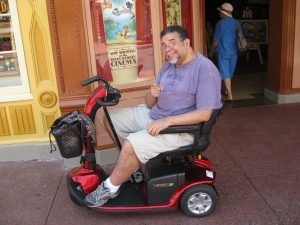On July 4- Thoughts of Independence, ALS and Aging

Today, here in America, we celebrate Independence Day. In our challenging political climate, I cannot help but reflect on how our independence seems so fragile. I think about my dad on holidays such as these, and how he, the proud Marine, lamented that less and less families displayed a flag. As much as I miss him, I am relieved that he is not living through these times because I firmly believe that it would make him physically ill. He would be worried about my future, but at least now he is watching over me.
I also can’t help but think of independence as it relates to ALS and to aging.
My dad was used to being the tough guy- after all, he was a Marine. As he got older, it was hard for him not to be able to manage the tasks that required physical strength. It was a hard thing to admit that aging has taken some of his independence. Even things that he could do independently, he wanted me to take care of. He wanted his independence but he wanted to depend on me. He wanted to know that I was there for him. I navigated his pride as I, the consummate klutz, and a pretty weak one at that- lifted and schlepped for him. He worried about my back but he did not want to have groceries delivered. I shopped in the city, cooked for him and brought everything to him by train. I know that he was comforted in the knowledge that I was going to take care of him. He was coping with fear of being alone, fear of his cancer progressing, fear of dying, and even fear of leaving me. Whatever it was, my dad had cancer, he was more than eighty years old, and I loved him. I was his caregiver and I was his daughter. Actually, anyone I met during his doctor appointments or visits to the neighborhood told me that I was his life. I knew that and he wanted me to know that.

Daddy loved to visit the Cradle of Aviation museum and relive his USMC days.
Ben dealt with a loss of independence as ALS stripped more and more of his abilities. ALS, or amyotrophic lateral sclerosis, is a progressive neurodegenerative disease that ultimately results in the loss of voluntary muscle action. Patients are affected differently in terms of progression, but people may lose the ability to speak, eat, move and breathe in any order of events. Ben’s initial symptoms were weakness in his legs and lack of balance. Next, he struggled with the use of his arms and hands, then his ability to chew and swallow. His speech was impaired though he did not lose it until he had a tracheostomy, and he got a feeding tube at the same time.
Imagine the loss of all of those abilities that we take for granted. People with ALS cannot independently take care of daily life activities. That is a physical and emotional struggle. I was always struck by Ben’s sense of humor and determination to devise strategies for managing on his own. He was quick to purchase things like adaptive zipper pulls and computer accessories that allowed him to function at least somewhat independently. He loved his scooter and electric wheelchair because they gave him the freedom to get around and be outside. As he lost dexterity in his hands, it became more difficult for him to steer, but he could be out and about. He tried hard to avoid, for as long as possible, his loss of independence.

As Ben’s caregiver, as he became increasingly dependent on me, I, too, lost independence. This was an emotional battle for both of us. Even within couples and families, each person maintains a certain level of independence. Ben and I lost that independence, albeit in different ways. I could no longer take time for myself. And, I witnessed Ben’s struggle and was consumed with trying to accommodate his efforts to maintain some level of independence. Ben and I were dependent on each other in this world in which our relationship was shifting beyond our control and we desperately wanted to maintain some semblance of who we were at our core, before ALS. After I lost Ben, I was frequently told that it was good that I could now reclaim my freedom. Only now, nearly four years later, am I becoming more comfortable with my independence. Still, I blog and maintain my deep connection to people who are experiencing ALS, as patients or caregivers. My experience left me with some battle scars, but it also left me with a tremendous appreciation of and perspective on independence.

Walt Disney said that “Mickey Mouse is, to me, a symbol of independence.” This was said in the context of the success that it brought him and his company, and the freedom to pursue his dreams. “Independence” is vital to our existence in many literal and figurative ways. On Independence Day, we honor this country and its founding principles. Let’s be grateful for independence. Let’s fight to preserve those values that are currently under attack and being chipped away and could potentially impact on the medical care and research that strives to help make ALS more manageable and, ultimately, to eradicate this cruel disease. In my practical way, I contribute, through donations, volunteering and the raising of awareness about ALS. In my Disney way, I continue to wish for and dream about a cure for ALS and all other diseases.

Happy and Hopeful Independence Day.